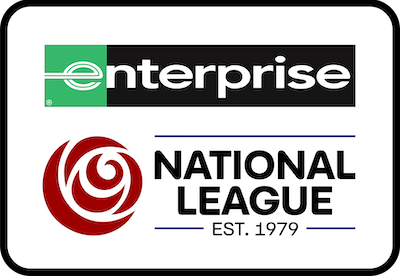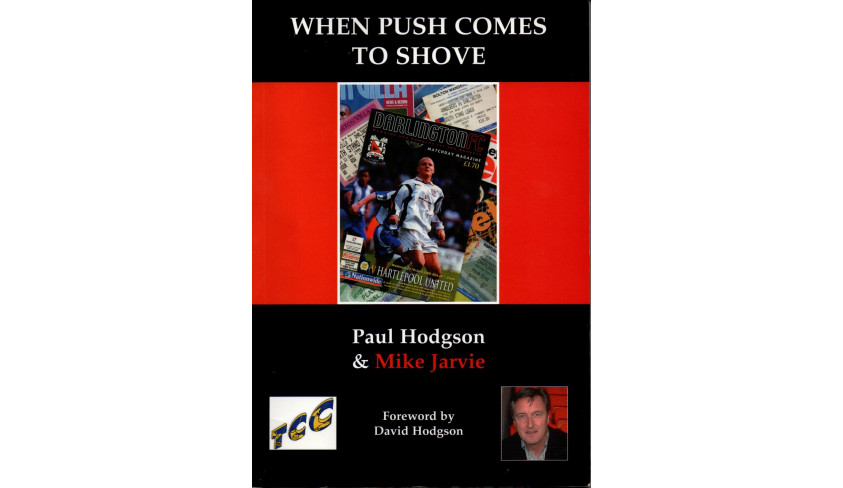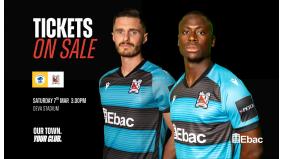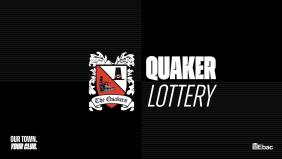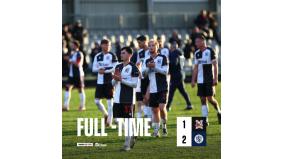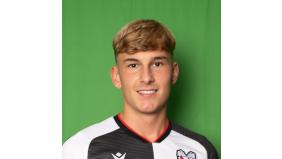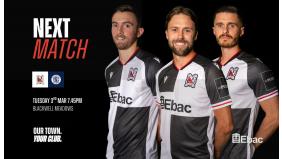Chapter Three of Paul Hodgson's book
Paul Hodgson has kindly agreed for us to publish his book on the official website over the next few weeks -- here's the third chapter, covering September 1998.
For the first game in September Darlo visited Mansfield Town. I went there on the train with Roger Martin, a friend of about five years standing.
The two of us changed trains at Sheffield but there was no assistance as promised when we actually arrived. The station official apologised and explained that staff at Darlington station hadn’t faxed them with the relevant details.
Luckily, a woman with a pushchair helped Roger to lift my wheelchair off the train.
We then continued on our journey to Worksop and finally arrived in Mansfield, where we had planned to meet Karl Alexander from Colchester.
The story goes that Karl once saw Colchester, his home town club, get beaten by Darlo so he decided that because the Quakers were the better team on the day, he’d follow them instead. And so he has ever since.
Eventually Karl turned up at a pub near the ground called the Early Doors, along with Brian Elsey and Trevor Rutter from Sheffield.
As we relaxed over our drinks, we got chatting to some Mansfield fans about their chairman and discussed the case of Steve Whitehall, the Mansfield centre-forward, who had been sold to Oldham because he wasn’t being paid by his club. In fact, it emerged during our conversation, that the PFA had been paying the Mansfield players’ wages.
Upon entering the ground, Roger and I discovered that both ends behind the goals had been cordoned off for safety reasons – hence no fans were allowed in those areas. This robbed the match of much of its atmosphere to say the least.
During the game, referee Tony Leake sustained a knee injury and was replaced after only sixteen minutes by his assistant, Neil Hancox. Fortunately, Hancox proved to be an able deputy.
The match was settled when Marco Gabbiadini, who earlier had a “goal” disallowed for offside, sent a low shot past goalkeeper Ian Bowling on thirty-three minutes. “No trouble at Mill as Darlington march on” wrote The Northern Echo in its match report the following Monday. The win left our promotion train firmly on track.
After the game, Roger, Karl and I went for a drink in the Mansfield Supporters Club bar. Again we chatted to some Mansfield fans who, to a man, admitted that Darlo were the better team on the day and looked like promotion contenders. These remarks were certainly pleasing to hear, especially as they came from opposition supporters.
From there we had a few more pints in a pub near the station and caught the train home, arriving back in Darlington at around ten o’clock.
With a bumper crowd expected for the local derby against Hartlepool United, Mike, Ian and I decided to meet up in the Centre Spot rather than having a pint elsewhere in town.
The 123rd derby was surrounded by controversy before a ball had even been kicked. An attempt had apparently been made by Cricket Club officials to nail the gates of Feethams shut, according to Ken Lavery, who regaled Mike and me with the story after the game in the Centre Spot.
The match had therefore been in the balance because, although fans could have entered through the turnstiles, access could not have been guaranteed for safety vehicles. Fortunately, an agreement was reached between the two feuding parties and the gates were unlocked.
On this occasion, Mike sat with me in the pitchside disabled area. We witnessed a shaky start by Darlo during which former Quakers’ loanee, Craig Midgely, missed two gilt-edged chances.
In the second half our two forwards Darren Roberts and Marco Gabbiadini started to look as though they were actually a partnership and began to run the game. It therefore came as no surprise when they each netted a goal, making the final score 2-0 to the Quakers.
In some respects Hartlepool could have counted themselves hard done by, but Mike, Ian and I didn’t give a damn because we had put one over on our fiercest rivals, and that was all that mattered.
Our next match was a 2-1 away win at Plymouth Argyle (goals courtesy of Marco Gabbiadini and Jason De Vos). Unfortunately, I didn’t go to that game due to a mix up with John Gray. He thought I was going with Ian, but I wasn’t, so by the time John found out it was too late as he had already bought his train ticket. In reality, it wasn’t anyone’s fault, just a simple misunderstanding. At least we won though, and the win took us to the top of the league.
On the day of the Plymouth game, Mike phoned me to explain that he had received further correspondence from Hamilton and Co. He told me that the letter said that our manuscript had now been fully appraised by their editorial department and had been passed to other colleagues with-in the firm with a view to possible publication. It went on to say that we would hear from them again quite soon.
One sentence in particular – “It might well be that the decision is to proceed” – made us very optimistic indeed about the likelihood of the book being published. Our hopes were therefore raised considerably by this news and we eagerly awaited the outcome.
Shrewsbury Town were our visitors to Feethams the following week. For this game I went with Ian in the pitch-side disabled area.
On reading the matchday programme, I found out that Alan Walsh the club’s record goal scorer had a short spell at Shrewsbury during the 1991-92 season, a fact that I’d totally overlooked. Walsh is still a legend to all Darlo fans to this day.
Back to the game in question. Mike Peden, the club’s Chief Executive, writing in the programme, exhorted the fans to sing “That’s the Way” by KC and the Sunshine Band every time we scored. The idea, however, just never caught on.
After four back-to-back victories, this game, against the division’s bottom club was a potential banana skin. Despite their lowly league position Shrewsbury, much to the frustration of the Darlo fans, matched the Quakers for long periods.
Eventually, Darlo won 1-0 in what can only be described as a scrappy match in which Michael Oliver scored the winner – his first goal of the season.
Interestingly, after witnessing another assured defensive display from Jason De Vos, Mike and I discovered from a conversation with a local journalist that Bruce Rioch, the Norwich City manager, had been watching our central defender that day. The journalist also said that scouts had been present at Mansfield.
Our final game of September was away at Brentford who had just invested £850,000 in two players (Herman Hreidarsson and Tony Folan). This represented a massive outlay for a Third Division club.
I travelled on my own to the game, catching the half-past eight train to Kings Cross and help was available at Darlington station ticket office to get me on board.
I actually found myself sitting next to a blind lad with a white stick. When he heard me rustling my newspaper he asked me to read him the headlines.
At Kings Cross I met up with Stephen Lowson, Brian Elsey and Trevor Rutter from Sheffield, Mark Trenholme from Ruislip and another lad called John Wilson also from London. We had a drink in Coopers Bar on the station platform before catching a tube on the Piccadilly line to South Ealing.
Stephen helped me down the escalator to the platform and knew the route well. There were fifteen stops altogether.
The ground was one mile from the tube station and we stopped off at a pub near Griffin Park for a couple of pints.
For this match I managed to get in the away end, but it was a poor game. In fact, it was Darlo’s worst performance of the season so far, not helped by former Premiership referee Paul Danson who had been demoted to wreak havoc in the Football League instead. Whistle-happy Mr Danson awarded ten free-kicks in the first ten minutes and thirty-eight in total – thus disrupting the flow of the game entirely.
At the press conference after the match Darlington manager David Hodgson fumed: “When they scored their first goal I expected the public address to play the Dambusters March because the ball bounced that many times before it went in.”
Unfortunately, two more of these “bouncing bombs” hit the back of our net – thus ensuring that we left London pointless after a 3-0 defeat.
Somewhat demoralised by the nature of the scoreline, we made our way back to Kings Cross where we were greeted at Customer Services by a really friendly member of staff who helped me on board the train. In my carriage there were some Boro fans who had also suffered a defeat in London at the hands of Chelsea.
It turned out that one of them didn’t have a ticket. The guard therefore told him, “I shall have to eject you from the train at the next stop.” His mates then menacingly said, “Just try it!” In the end he gave the guard £30 and his home address, which seemed to defuse the potentially volatile nature of the situation. To be honest, I found the whole scenario rather amusing.
On arrival at Bank Top station Mike was already waiting on the platform to help me off the train. Once he had done so we headed for the Dalesman where we reflected on the Brentford game and the month as a whole over a few beers. We were both still quite happy despite the defeat as we had only lost one game in September and were second in the league. Promotion was therefore still very much a possibility.



